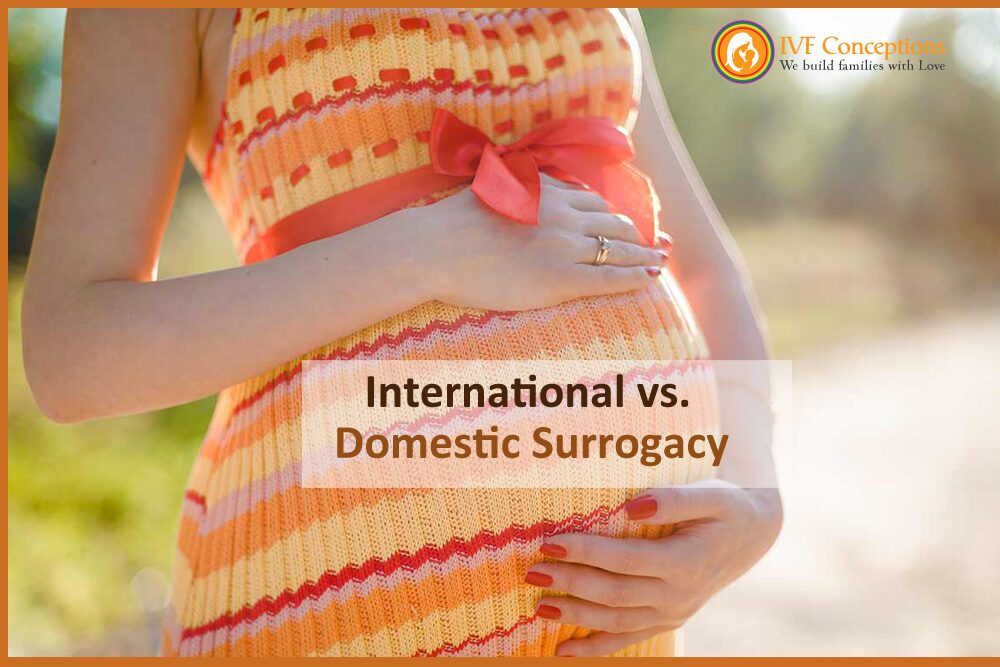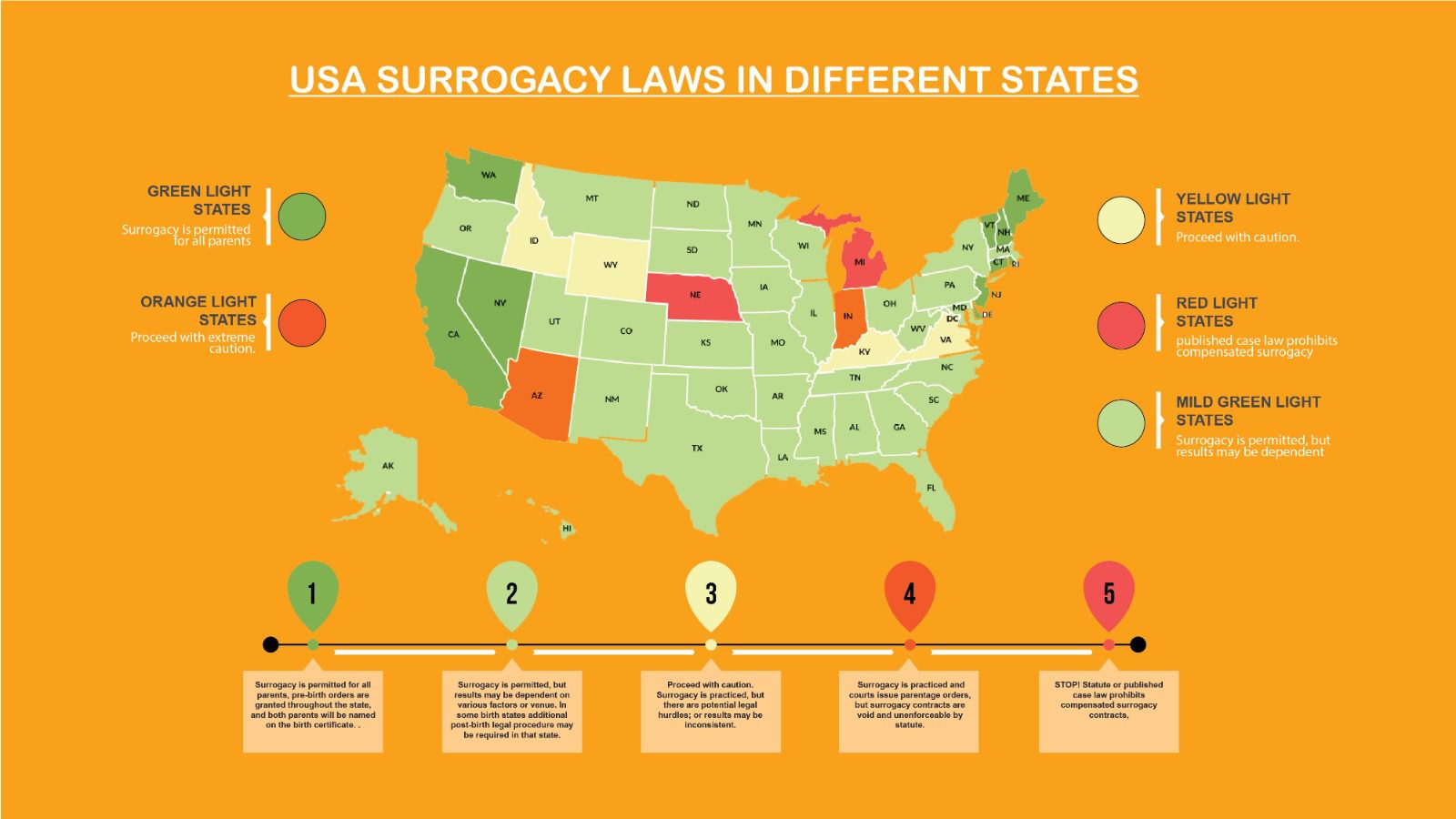Gestational Surrogacy In Pennsylvania: A Comprehensive Guide for IPs

For both intended parents and surrogates, surrogacy in Pennsylvania is a simple, quick, and secure process. Surrogacy in Pennsylvania is regarded as “surrogacy friendly.” The Pennsylvania Superior Court has overturned rulings made by lower courts that restrict intended parents’ rights and surrogacy contracts, notwithstanding the absence of any express case law or legislation to the contrary.
However, in the absence of legislation, the availability of parental orders still varies throughout the state.
In Pennsylvania, there are no laws or public case rulings that expressly allow or forbid surrogacy; nevertheless, two unpublished rulings that support the practice are J.F. v. D.B., 897 A.2d 1261 (2006) and Whitewood v. Wolf, no. 1:13-cv-1861 (2014). This decision made surrogacy lawful in Pennsylvania, where it has remained a common method of expanding families ever since.
Surrogacy is permitted in Pennsylvania in a variety of distinct family contexts. When additional obstacles make pregnancy challenging, people might grow their families through the surrogacy procedure. In Pennsylvania, surrogacy is a wonderful method to expand your family.
Among the states in the United States, Pennsylvania is one of the most welcoming for surrogacy. Both the intended parents and the surrogate are guaranteed protection of their rights throughout the procedure by Pennsylvania’s surrogacy laws. For individuals thinking about surrogacy, Pennsylvania also provides several additional benefits.
Pennsylvania is the perfect state for anyone considering surrogacy as an intended parent or surrogate due to its surrogacy-friendly status, world-class healthcare, supportive surrogacy community, ideal location, and dedication to diversity and inclusion.
Contact us directly for a free consultation!🤝
📲 +91-8800481100 ( WhatsApp, Line, Viber)
Additional guides for surrogacy in the USA:
Surrogacy In the USA is Made Easy and Affordable.
How Much do Surrogacy Agencies Charge in the USA?
How Much Does Surrogacy Cost in the USA ( 2023)?
Why USA Couples Should Do Surrogacy In Georgia, Europe?
Surrogacy Financing Options For Intended Parents
Why Surrogacy Costs So High And How To Manage It?

An Overview Of Surrogacy In Pennsylvania
In Pennsylvania, there are presently no laws that regulate the surrogacy industry. Although a higher court reversed a previous court’s finding that surrogacy agreements were against public policy and that a gestational surrogate was the mother of a child delivered via surrogacy in 2006, the case set a norm for surrogacy in Pennsylvania. Both Surrogates and intended parents need to know the surrogacy legal status in any location.
This decision made surrogacy lawful in Pennsylvania, where it has remained a common method of expanding families ever since. In Pennsylvania, surrogates may be paid for their services. Traditional surrogacy is allowed in Pennsylvania because there are no state laws or published cases that forbid it.
But under Pennsylvania law, a typical surrogacy is regarded as an adoption; therefore, pre-birth orders cannot be carried out and a surrogate cannot be paid for her services. Surrogacy agreements are upholdable in Pennsylvania courts.
Depending on the judge who is asked to make the order, intending parents may or may not be able to obtain parentage orders. Even if they have no genetic connection to the child being born via surrogacy, increasingly progressive judges will grant paternity declarations before birth to married couples, unmarried couples, and individuals.
However, some more conservative courts won’t accept parentage assertions. The intending parents will probably have to perform an adoption to establish their parental rights to their child if a parentage order cannot be made.
The post-birth adoption of a child born via surrogate in the county of the intended parents’ residence is permitted by Pennsylvania law, but only for Pennsylvania residents. For unmarried couples, second-parent adoptions are permitted in Pennsylvania. Stepparent adoption allows married couples to complete the adoption procedure more quickly.
Related surrogacy Costs guides:
What is the average surrogacy cost?
How much does surrogacy cost in Ukraine?
How much does surrogacy cost in Georgia?
How much does surrogacy cost in India?
What is the Surrogacy Cost in Colombia?
What is Surrogacy cost in Mexico?
What is surrogacy cost with family members?
Surrogacy Laws In Pennsylvania
 Pennsylvania is one of the states where surrogacy is neither expressly allowed nor outlawed because there are no laws that specifically address it. Although there are no regulations in Pennsylvania, this does not mean that surrogacy is prohibited or not possible there. In reality, the state has seen a lot of fruitful surrogacy trips.
Pennsylvania is one of the states where surrogacy is neither expressly allowed nor outlawed because there are no laws that specifically address it. Although there are no regulations in Pennsylvania, this does not mean that surrogacy is prohibited or not possible there. In reality, the state has seen a lot of fruitful surrogacy trips.
The most popular type of surrogacy in Pennsylvania is gestational. In gestational surrogacy, the intended parents’ or donor’s genetic material is used to create a child through in vitro fertilization (IVF) and the surrogate. The legal aspects of surrogacy are made easier by the fact that there is no genetic link between the surrogate and the child.
Surrogacy Contract
In Pennsylvania, surrogacy contracts are an essential aspect of the surrogacy procedure since they provide all parties with legal protection and clarity. These agreements are detailed and frequently cover a wide range of topics, such as the duties and rights of the intended parents, the surrogate, and any egg or sperm donors.
They describe the financial arrangements, what is expected of prenatal care and childbirth, and how legal paternity is established. Surrogacy agreements are frequently upheld by Pennsylvania courts, making them an essential tool for protecting the intentions and interests of both the intended parents and the surrogate, ultimately resulting in a smoother and more secure surrogacy process for all parties.
Parentage Orders
In Pennsylvania, prospective parents have the option of obtaining pre-birth orders, which give them legal parental rights before the baby’s birth. The post-birth legal processes are streamlined by this legal procedure, facilitating and securing the transition to parenting.
Legal action is always required to formally recognize the intended parents as the child’s legal parents in a surrogacy situation. In Pennsylvania, a pre-birth order of parentage is commonly used to do this.
Getting a pre-birth order is advantageous for several reasons:
- It enables the names of the intended parents to appear on the original birth certificate of the child.
- It guarantees that the infant can be released to the intended parents at the hospital.
- It gives the intended parents the ability to decide on crucial medical decisions for the newborn at delivery.
- It might assist in resolving insurance coverage problems
- Plus more
In Pennsylvania, if an anonymous donor is used, he or she does not have parental rights that need to be legally terminated. Many intended parents require the services of an egg or sperm donor during the surrogacy process, and it is important to make sure the rights of those donors are handled legally.

How Much Does Surrogacy Cost In Pennsylvania?
Surrogacy costs in Pennsylvania often mirror national averages, ranging from $90,000 to $130,000+ for traditional and gestational arrangements. Intended parents can expect expenses spanning:
IVF Costs: At about $10,000 to $15,000 per cycle, creating embryos carries significant costs in addition to compensation for the gestational carrier. Most pursue at least 2 cycles.
Surrogate Compensation: The bulk of expenses provide payment installments covering compensation, health insurance, legal expenditures, and reimbursements for the selfless surrogate. This ranges from $35,000 to $55,000.
Escrow Services & Management: About $2,000 to $5,000 covers administrative costs and transferring set monthly amounts into a protected account.
Screening & Enrollment: Medical, psychological, and background checks on all parties cost roughly $3,000 to $5,000 altogether.
When you tally up these key buckets, in addition to supplemental programs, legal contracts, and other variable expenses, total costs eclipse six figures for most intended parents across the state. Here’s a helpful breakdown:
| Surrogacy Cost Component | Typical Average Cost of Surrogacy |
|---|---|
| IVF Treatments | $20,000 – $30,000 |
| Surrogate Compensation | $35,000 – $55,000 |
| Escrow Services | $2,000 – $5,000 |
| Screening/Enrollment | $3,000 – $5,000 |
| Total Cost Range | $90,000 – $130,000 |
Using this estimated cost data allows intended parents in Pennsylvania to adequately save, budget, and prepare for the financial commitment ahead in their surrogacy journey.
Factors Influencing Surrogacy Costs/Surrogacy Compensation
Surrogacy Agency: Every step of the surrogacy procedure is facilitated by a surrogacy agency, which can guarantee the greatest results for the unborn child, the parents, and the gestational carrier. Additionally, organizations offer assistance to potential parents looking to connect with a gestational carrier to start a family.
Medical Expenses: These expenses cover the price of labor, prenatal care, and fertility treatments.
Compensation for Surrogates: Surrogates are compensated for their altruistic and priceless assistance.
Legal Fees: To ensure that everyone’s rights are upheld, both the intended parents and the surrogate must have legal representation.
Other Expenses: These could consist of travel, insurance, and unanticipated medical bills.
Surrogacy For Intended Parents in Pennsylvania
Surrogacy is permitted in Pennsylvania in a variety of distinct familial situations. When additional obstacles make pregnancy challenging, people might grow their families through the surrogacy procedure. It presents the surrogate mother with the chance to assist a family in receiving a lovely gift. In Pennsylvania, surrogacy is a wonderful method to expand your family.
You may take into account surrogacy as an intended parent if:
- Getting pregnant is difficult for you or your partner.
- You and your partner are a same-sex couple seeking a genetic connection for your offspring.
- Being pregnant is not a possibility for you because you are single.
- A pregnancy that you started could not be carried to term.
 Surrogacy Process In Pennsylvania
Surrogacy Process In Pennsylvania
In Pennsylvania, there are no surrogacy regulations. However, you should constantly educate yourself about the specific ways that living in Pennsylvania can affect your surrogacy process as an intended parent. That said, it doesn’t mean that you can’t explore surrogacy as a family-building choice as a resident of Pennsylvania.
Depending on your particular situation, each surrogacy journey is distinct, but in general, these are the six processes involved in surrogacy in Pennsylvania:
- Choosing the ideal match between intended parents and surrogates is the first stage in the intended parent and surrogate matching process.
- Legal agreements are made to safeguard everyone’s rights and require that both couples undergo medical assessments.
- Embryos are produced through in vitro fertilization (IVF) using donated gametes or the genetic material of the intended parents.
- A pregnancy test is performed to determine the viability of the chosen embryo prior to its implantation into the surrogate’s uterus.
- The surrogate is provided first-rate care throughout her pregnancy, and the intended parents are eagerly anticipating the arrival of their child.
- The legal procedure is finished after the baby is born, making the intended parents the child’s legal parents.
Finding A Surrogate Mother In Pennsylvania
 Selecting the ideal surrogate mother is essential to a successful and satisfying surrogacy journey. Pennsylvania offers a variety of ways for intending parents to discover a surrogate mother who can help them realize their parental ambitions because of its diverse population and progressive regulations.
Selecting the ideal surrogate mother is essential to a successful and satisfying surrogacy journey. Pennsylvania offers a variety of ways for intending parents to discover a surrogate mother who can help them realize their parental ambitions because of its diverse population and progressive regulations.
Surrogacy Agencies: Surrogacy agencies serve as matchmakers, finding suitable surrogate moms for intended parents. These organizations offer a wide range of services, such as counseling, medical examinations, and legal assistance. The interests of both parties are safeguarded by agencies throughout the procedure.
Online Surrogacy Platforms: Several websites and discussion boards are devoted to surrogacy. Intended parents can build profiles and interact with possible surrogate mothers on websites like Surrogate.com and SurrogateFinder.com. These platforms offer a safe setting for introductory conversations and meetings.
Fertility Clinics: Surrogate moms are frequently in contact with fertility clinics. These facilities can help with the matching procedure and make sure the surrogate mother satisfies all required medical standards. Working with a fertility clinic gives you access to knowledgeable medical experts who can help you through the full surrogacy process.
Social media and support groups: There are surrogacy-specific groups on social media sites like Facebook and Instagram. Intended parents can communicate with surrogate moms directly by joining these groups. Local support groups also frequently host gatherings where potential parents might meet surrogates in person.
Surrogacy Conventions and Events: Attending surrogacy conventions and events is a great way to network with experts in the industry as well as potential surrogate moms. These gatherings give intending parents the chance to speak with a variety of surrogates, empowering them to select one after doing their research.
Conclusions
Although Pennsylvania does not have an explicit surrogacy statute, the practice is also not outright forbidden. As a result, those interested in surrogacy frequently traverse an unclear legal environment, which can provide some difficulties and ambiguities. Anyone seeking surrogacy in Pennsylvania must speak with legal experts who focus on reproductive law to fully comprehend their rights, obligations, and the legal procedures involved in the procedure. To ensure a good and successful surrogacy experience, open communication and teamwork between intended parents, surrogates, and medical professionals are also essential.
If you’d like to learn more about IVF, Egg Donation, or surrogacy services globally, check out the rest of our website at IVF Conceptions. We offer legally secure and affordable surrogacy consulting services for FREE.
Contact us directly for a free consultation!🤝
📲 +91-8800481100 ( WhatsApp, Line, Viber)

Frequently Asked Questions About Surrogacy In Pennsylvania
1. What is surrogacy?
Surrogacy is a legal arrangement in which a woman (the surrogate) carries and gives birth to a child for another person or couple (the intended parent), who will become the child’s legal parent(s).
2. What are the laws regarding surrogacy in Pennsylvania?
Surrogacy in Pennsylvania is governed by specific statutes and court decisions. It’s important to understand Pennsylvania surrogacy laws and work with experienced legal professionals to navigate the legal aspects of surrogacy in the state.
3. What is the surrogacy process in Pennsylvania?
The surrogacy process in Pennsylvania involves several steps, including selecting a gestational surrogate, undergoing embryo transfer, and executing a surrogacy contract outlining the rights and responsibilities of the parties involved.
4. Can anyone become a surrogate in Pennsylvania?
In order to become a surrogate in Pennsylvania, individuals must meet certain criteria and go through a thorough surrogacy evaluation process with a surrogacy agency or Pennsylvania surrogacy attorney.
5. Are pre-birth orders available for intended parents in Pennsylvania?
Yes, Pennsylvania allows for pre-birth orders to establish the intended parents’ parental rights before the birth of the child through surrogacy.
6. What are the costs associated with surrogacy in Pennsylvania?
The cost of surrogacy in Pennsylvania can vary widely and may include compensation for the surrogate, medical expenses, legal fees, and other related costs.
7. What are the different types of surrogacy recognized in Pennsylvania?
Pennsylvania recognizes gestational surrogacy where the surrogate is not genetically related to the child, as opposed to traditional surrogacy where the surrogate uses her egg.
FAQs for Surrogacy in the USA
 Q1. What is the process of surrogacy in the USA for intended parents?
Q1. What is the process of surrogacy in the USA for intended parents?
Ans. The surrogacy process in Pennsylvania for intended parents involves multiple steps, starting with a consultation to discuss your story and questions. Working with an experienced agency Surrogacy guides through milestones like choosing an agency, finding a surrogate, medical screening, and legal contracts.
Q2. How much does surrogacy in the USA cost?
Ans. The cost of surrogacy in the USA varies depending on the program you choose. The cost of surrogacy starts at $150,000 to $200,000 based on the specific services needed and the compensation of the surrogate mother and egg donor. For low-cost surrogacy, it is advised to consider “independent surrogacy or private surrogacy”, which costs less but requires more time and management.
Q3. What are some affordable surrogacy options?
Ans. Affordable surrogacy options are:
- Opting for independent surrogacy arrangements.
- Using a surrogate mother within the family or friend circle.
- Considering the international surrogacy countries with affordable, low-cost surrogacy programs like Mexico, Colombia, Argentina, Georgia, and Ukraine.
Q4. What are the requirements for becoming a surrogate mother in the USA?
Ans. The requirements for becoming a surrogate mother are:
- To become a surrogate mother, you must meet certain criteria.
- You should have delivered a child of your own and be parenting at least one child.
- Uncomplicated pregnancies and deliveries are necessary, as documented by medical records.
- Age requirements are between 21 and 44 years old.
- The Body Mass Index (BMI) is typically no higher than 33.
- Surrogates should be citizens, legal residents, or legal immigrants of the United States.
- medically and psychologically in sound condition.
Q5. Can you help us find a low-cost surrogate mother?
Ans. Yes, we have been working in the international surrogacy domain for 13 years and have good networks of fertility clinics and surrogacy agencies globally that are trusted to offer world-class services. We have long expertise and experience in the best and most legal international surrogacy countries.
Disclaimer:
All legal information on this website is intended only as a guide and is not a replacement for the opinions of licensed legal professionals/Medical professionals. Some information may have changed since the time of publication. We advise you to consult a licensed attorney/Medical expert with authority in fertility/surrogacy processes.
More Resources:
- American Society for Reproductive Medicine (ASRM): https://www.asrm.org/
- The American Infertility Association (AIA): https://resolve.org/
- Family Equality Council: https://www.familyequality.org/
- National Center for Lesbian Rights (NCLR): https://www.nclrights.org/

 Surrogacy Process In Pennsylvania
Surrogacy Process In Pennsylvania